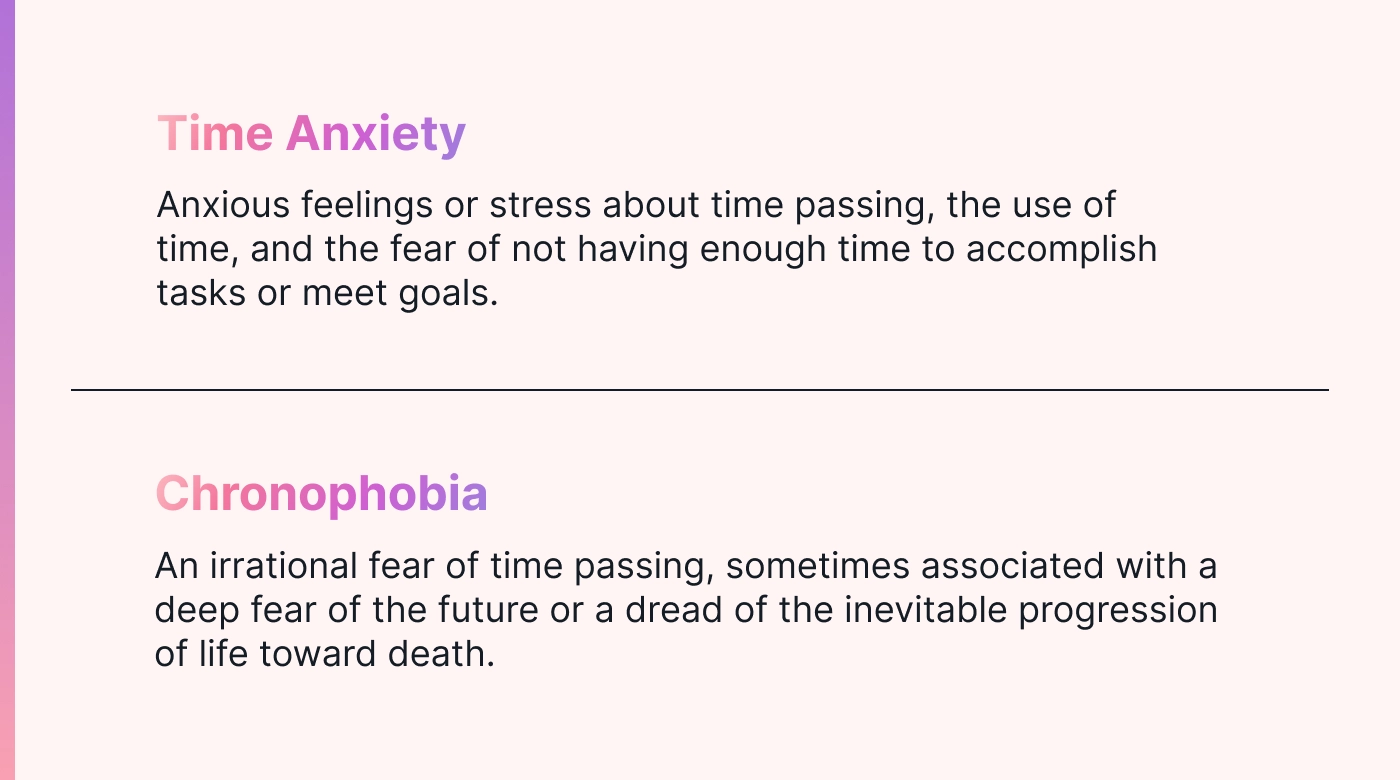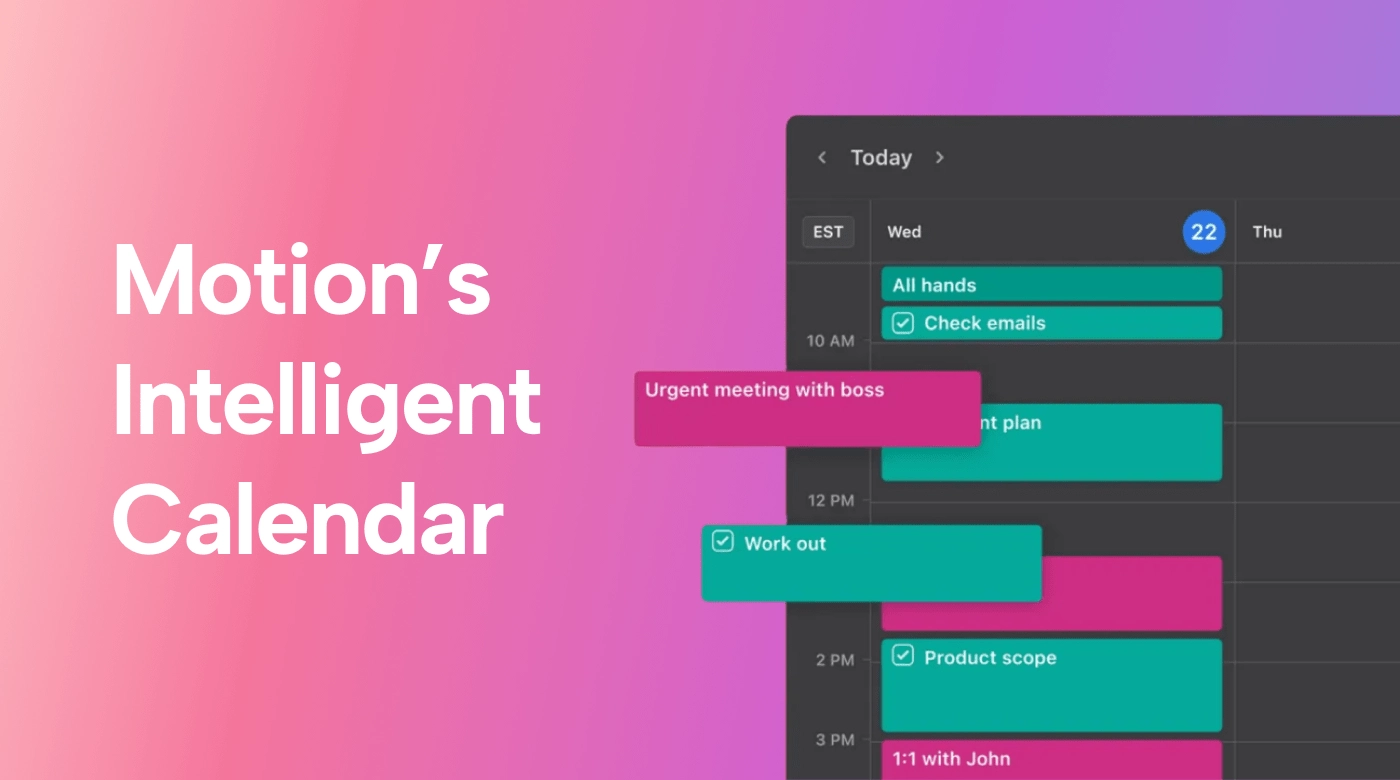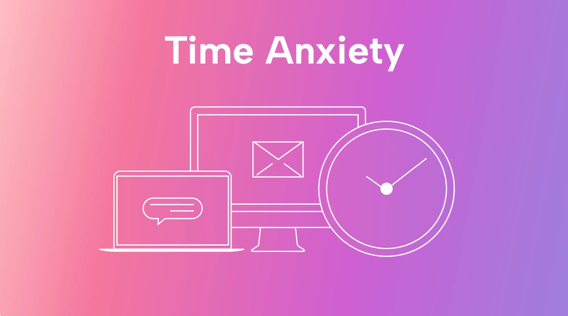Do you feel overwhelmed when you hear the ticking clock at work? Does every glance at your watch send a wave of anxiety down your spine?
You might have time anxiety. This surprisingly common work issue can change what should be manageable tasks into mountains of stress.
This article explains what this often crippling condition is all about and where it comes from. We’ll also offer guidance and practical steps for overcoming it.
What is time anxiety?
Time anxiety is a feeling of worry or unease about time passing or the fear of wasting time. It can also manifest as anxiety caused by the perception that you don’t have enough time to meet your personal or professional obligations.
Other signs are a constant concern over how you’re spending your time, a fear of future events or deadlines, or a sense of distress about time slipping away while you’re not achieving the significant goals you’ve set for yourself.
"Time anxiety" is not classified as a distinct medical condition. However, it can be a symptom or aspect of other recognized anxiety disorders, a group of mental health conditions characterized by excessive fear, worry, and feelings of anxiety that are persistent and can interfere with daily activities.
Anxiety is a major issue in the workplace. One study found that “60% of employees are experiencing at least mild symptoms of anxiety, with 25% experiencing clinically relevant symptoms.”
Worrying too much about time at work can be one of these mild symptoms of anxiety that add just one more layer of stress to employees’ already busy days.
Is time anxiety the same as chronophobia?
You may have heard the term “chronophobia” (fear of time) before. While similar, it’s not the same as time anxiety.
Time anxiety and chronophobia manifest in slightly different ways.

Generally, time anxiety refers to anxious feelings or stress about time passing, the use of time, and the fear of not having enough time to accomplish tasks or meet goals. It's about psychological stress and worry over how time is managed on a daily, personal level.
Time anxiety can affect anyone and might not always reach the threshold of a diagnosable anxiety disorder. It can include worries about daily scheduling, long-term life achievements, or simply the fleeting nature of time and the pressure to make every moment count.
Chronophobia, on the other hand, is more intense than time anxiety and can be classified under specific phobias in the realm of anxiety disorders. It’s associated with a deep fear of the future or a dread of the inevitable progression of one’s life toward death. As such, it can cause significant impairments in someone’s daily functioning and lead to intense psychological distress.
Chronophobia is often particularly prevalent among prisoners or the elderly, where the passage of time can feel more acutely distressing or significant.
The key difference between time anxiety and chronophobia lies in the intensity and focus of the fear. But both conditions highlight the profound effect that perceptions of time can have on our mental health and well-being.
Is time anxiety mainly a workplace issue?
Time anxiety can be primarily or exclusively triggered by the work environment for certain individuals. Factors like tight deadlines, competition among employees, and a culture of overwork can intensify feelings of time pressure.
Once away from their specific stressors, these individuals might not experience the same level of time anxiety in their personal or recreational activities.
For others, however, time anxiety is a broader issue. It can be a pervasive aspect of their lives that affects more than just their work.
Those with underlying anxiety disorders or perfectionistic tendencies — or who struggle with time management in general — may find that their anxiety about time spans all areas of their lives. They might feel a constant pressure to be productive or experience guilt when relaxing or engaging in leisure activities.

If you’re dealing with this second, all-pervasive form of time anxiety, a counselor or mental health professional can help you get it under control.
What does time anxiety look like in the workplace?
Just about every employee will experience moments of time anxiety in the workplace. A common scenario is not completing a task or project on time — and then having to face your supervisor and explain why you failed.
But employees who suffer from more habitual time anxiety may have specific symptoms. Here are a few of the most common ones:
Constantly watching the clock: This indicates an obsessive focus on the passage of time and constantly worrying about how much time is left for you to complete your tasks.
Feeling overwhelmed: This often manifests as a sense that there's always too much to do and too little time, which can lead to chronic stress and anxiety.
Avoidance behaviors: This involves procrastinating or avoiding certain tasks — especially challenging ones or tasks that are new to them — due to the fear of not having enough time to complete them properly.
Physical symptoms: Some employees experience physical problems like nervousness, headaches, stomach issues, or an increased heart rate when they’re just thinking about their workloads or deadlines, let alone doing them.
The impact of time anxiety on employee performance
Due to its broad reach, time anxiety can have a debilitating effect on employees’ performance in the workplace.
Here are the main ways this manifests:
Reduced productivity: Time anxiety can paradoxically lead to less efficiency since the constant stress it generates impairs focus and decision-making ability.
Lower quality of work: Rushed work or mistakes can result from time anxiety, affecting the quality of the work output.
Strained relationships: The stress of time anxiety can also affect interpersonal dynamics. For instance, stress about deadlines can generate conflicts with colleagues or supervisors. Or a stressed-out employee can simply become an unpleasant colleague to deal with on a daily basis.
Increased risk of burnout: Long-term, unresolved time anxiety can also contribute to burnout. Typical manifestations of this condition include exhaustion, cynicism, and less efficiency on the job.
Common causes of time anxiety in the workplace
Time anxiety at work doesn’t just happen. There are discernable causes and stressors, such as the following:
An overwhelming workload: An excessive amount of work or unrealistic deadlines can make employees feel like they're constantly racing the clock.
Perfectionism: A desire to complete tasks perfectly can lead to spending too much time on details, which, in turn, can fuel anxiety about not meeting deadlines.
Fear of failure: Anxiety over the possibility of not meeting expectations or achieving goals can intensify time-related stress.
Poor time management: Struggling to effectively manage time can lead to a cycle of procrastination and panic as deadlines approach.

When the underlying causes aren’t addressed, these manifestations of time anxiety can make an employee’s work life miserable.
How do I get rid of time anxiety at work?
Ridding yourself of time anxiety is, first and foremost, a matter of taking control over the internal and external factors that cause it.
The best approaches include better time management and learning to manage the psychological traits that make you vulnerable to time anxiety.
Here are our best suggestions and tips for tackling this challenging condition:
1. Create a daily plan and prioritize your tasks
Time anxiety and its paralyzing effects on your work output can hit right at the start of the work day. You can combat it by starting your day with detailed planning and prioritization. This takes some discipline, but it helps you tackle your work in a much more productive way.
Identify the tasks that need your immediate attention. Use a system that works for you, like the Time Management Matrix, to categorize tasks based on their urgency and importance. This helps you focus on what truly matters when you’re looking at a full plate for the day.
2. Break down large tasks into smaller ones
A skill related to planning and prioritization is breaking large, daunting projects and tasks up into smaller chunks.
The psychological effect of this approach is that the task seems more achievable right away. It also provides you with a clear roadmap and short-term goals that appear more doable than one big task staring you in the face.
This simple solution can motivate you to keep going since you’ll gain a sense of accomplishment as you complete each part.
3. Practice time management techniques
At the core of overcoming time anxiety is time management.
Time management has been studied extensively, and there are excellent systems available that work well for different personality types and needs.
To find out what works best for you, experiment with different time management techniques, such as the Pomodoro Technique, time blocking, or time boxing.

A nice feature of these methods is that they also help you take regular breaks, giving you a greater sense of relaxation and well-being.
4. Set boundaries
Taking on too much work can lead to time anxiety. Quite a few employees do this habitually, often out of concern for being seen as inferior or inadequate if they’re not constantly loading up their plates.
Learn to say “no” to tasks that overload your schedule or are outside of your job responsibilities. This might not come easy at first, but with practice, you’ll learn to find the right balance between doing too little and taking on too much.
That said, say “no” respectfully with a positive attitude and supported by clear evidence that you have too much on your plate.
Your supervisor may push back from time to time (after all, they are paid to keep you productive), but if you make a solid case, they’ll understand and learn to work with you to keep your schedule more transparent and less intimidating.
5. Embrace mindfulness and relaxation techniques
Sometimes, all you need to face your time anxiety head-on is to take regular moments to relax and center yourself.
A good way to do this is to incorporate some mindfulness practices, such as meditation or deep-breathing exercises, into your daily routine.
Here’s a simple breathing practice that’s easy to memorize:
- Sit up straight in your chair. Try not to face your computer as you do so.
- Close your eyes and center your attention on your heart.
- Experience your heart as a warm, glowing, comfortable place where you can feel at home and relaxed.
- Breathe slowly and deeply in and out. Make your inbreaths and outbreaths as long as you can while staying physically comfortable.
- After a few minutes of this relaxing rhythm, move your arms and legs and open your eyes. You’re now ready to tackle your tasks with a new level of peace and calm.
6. Use technology to stay on top of your schedule
It’s not easy for many employees to always keep a full, accurate overview of their projects and tasks in their heads. That’s why many keep to-do lists to stay on track.
If you’re using a traditional to-do list, consider switching to a more advanced solution, such as Motion’s intelligent task manager. This app takes all your projects, tasks, to-do lists, meetings, and other activities and organizes them into one perfect, optimized schedule that streamlines your day.
Think of a tool like this as a personal digital assistant that keeps you focused and on task. It takes the worry out of the question of “What do I do next?”

7. Seek support
Lastly, don’t hesitate to ask for support from your supervisor or HR department when you need it. This could mean seeking clarification on your priorities or requesting help or a deadline extension when you’re feeling overwhelmed.
If time anxiety continues to trip you up at work, HR can also help you find training or professional help. After all, they want you to succeed!
Conquer time anxiety with the right strategies and tools
Time anxiety can be a challenging psychological condition that makes your time at work unproductive and miserable.
But it’s not insurmountable. The suggestions in this article can help you get a grip on your time anxiety and find more peace and calm at work.
If you need technological support to help you overcome time anxiety, consider Motion. It will map out each day for you and help you stay on top of your projects and tasks.
Interested in experiencing this for yourself? Try Motion for free for 7 days.

A certified content writer and SEO strategist, Carla Groenewegen writes about success principles and practices aimed at SMBs and not-for-profit organizations.




